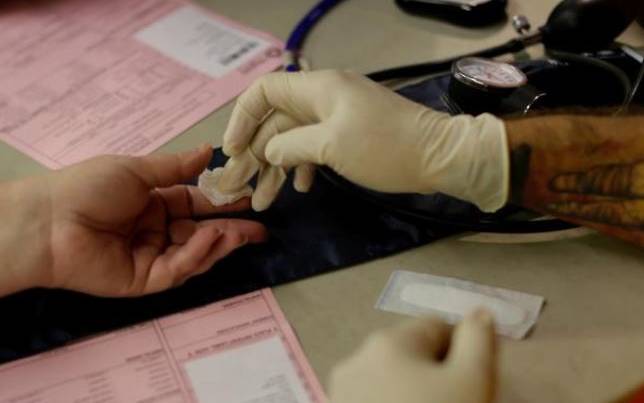
A woman has gauze applied to her finger after a blood sugar test at the Remote Area Medical Clinic in Wise, Virginia, U.S., July 21, 2017. Picture taken July 21, 2017. REUTERS/Joshua Roberts
The following is a roundup of some of the latest scientific studies on the novel coronavirus and efforts to find treatments and vaccines for Covid-19, the illness caused by the virus.
High blood sugar tied to Covid-19 risk in nondiabetics
High blood sugar may portend a rocky course for Covid-19 patients who seek hospital care, even if they do not have diabetes, according to a new study of 11,000 Covid-19 patients in Spain. None were critically ill when they got to the hospital. But researchers found those who arrived with above-normal blood sugar levels had higher odds of dying there - regardless of whether they were diabetic.
Overall, 20 per cent of the patients died while hospitalised, including 16 per cent of individuals with blood sugar below 140 milligrams per deciliter at admission, 34 per cent of those with levels of 140 to 180 mg/dL, and 41 per cent of patients with levels above 180 mg/dL. (A level of 200 mg/dL or higher indicates diabetes.) After taking age and medical conditions into account, patients with the highest levels were 50 per cent more likely to die in the hospital than patients with the lowest levels.
People with elevated blood sugar were also at higher risk for needing intensive care and mechanical breathing assistance. In a report published on Tuesday in Annals of Medicine, the researchers say prompt control of blood sugar should be mandatory in the management of patients hospitalized with Covid-19, regardless of whether they have diabetes.
No good answer yet for decontaminating masks for reuse
No single method for decontaminating healthcare workers’ personal protective equipment (PPE) for reuse stands out as best, according to a study published on Thursday in the American Journal of Infection Control, and reuse is not recommended if it can be avoided. Researchers analyzed 40 studies that tested various methods for sterilisation of N95 masks and higher-end filters.
They included steam, hydrogen peroxide, ultraviolet light, microwaves, and electric cookers, among others. Disinfection agents such as bleach, soap and water and alcohol were also tested. The outcomes differed by mask model, manufacturer and sterilization or disinfection process.
Furthermore, most methods appeared to result in at least some structural damage or weakening of the masks’ filtration ability, according to coauthor Vanessa de Brito Poveda of University of Sao Paulo, Brazil.
Along with disinfection or sterilization processes, health systems that reuse masks must consider the need for traceability, if the same mask may be shared by different professionals; controlling the number of reuses of each mask; training personnel to inspect mask integrity and functionality after routine wear and tear, and cleaning methods to eliminate organic matter and soil (like residual cosmetics). “The scientific evidence available until this moment do not support any process as safe,” de Brito Poveda said, although she believes automated methods are safer than manual methods.
 The Standard Group Plc is a multi-media organization with investments in media
platforms spanning newspaper print
operations, television, radio broadcasting, digital and online services. The
Standard Group is recognized as a
leading multi-media house in Kenya with a key influence in matters of national
and international interest.
The Standard Group Plc is a multi-media organization with investments in media
platforms spanning newspaper print
operations, television, radio broadcasting, digital and online services. The
Standard Group is recognized as a
leading multi-media house in Kenya with a key influence in matters of national
and international interest.











